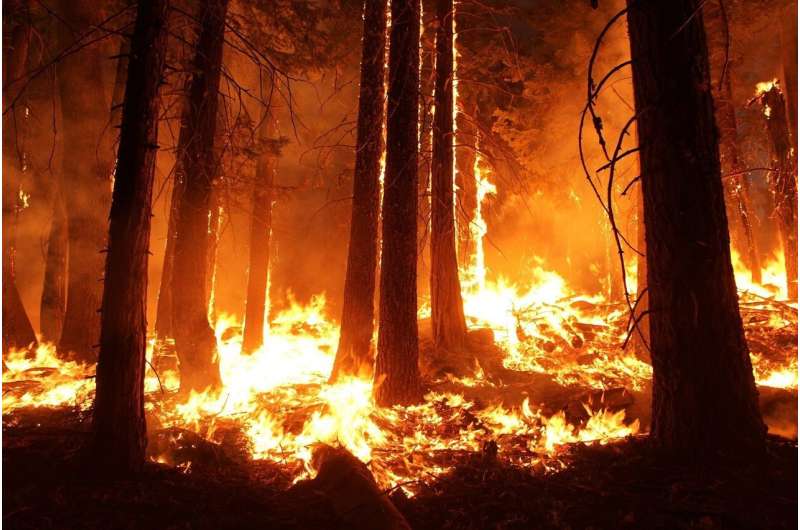The Hidden Cardiovascular Risks of Wildfire Smoke Extending Beyond Fire Zones

Wildfire smoke extends its health threat beyond fire zones, increasing the risk of heart attacks and cardiovascular events even in regions far from the fires. Learn how to protect your heart health during wildfire seasons.
Recent findings highlight that wildfire smoke, especially from extensive forest fires like those in Canada, poses a significant yet often overlooked risk to heart health, even in regions far from the actual fire sites. While the primary concerns about wildfire smoke have traditionally centered on respiratory issues, emerging research underscores its substantial impact on cardiovascular health.
Wildfire smoke is laden with pollutants, notably fine microscopic particles called particulate matter (PM2.5), which can penetrate deep into the lungs and enter the bloodstream. This infiltration can trigger inflammation and oxidative stress, leading to increased risks of heart attacks, arrhythmias, strokes, and other cardiovascular events.
Studies presented at the American Heart Association's Scientific Sessions 2023 reveal that short-term spikes in air pollution caused by wildfire smoke are linked to immediate health effects. For example, researchers discovered that during wildfire seasons, hospital admissions for unstable chest pain spiked on the same day in Utah. Furthermore, a 2020 study indicated that exposure to heavy wildfire smoke increased the risk of out-of-hospital cardiac arrests by up to 70%. Other research observed a 42% rise in emergency room visits for heart attacks and a 22% increase for ischemic heart disease within a day of dense smoke exposure, particularly affecting adults over 65.
Individuals with pre-existing cardiovascular conditions or risk factors are especially vulnerable. Recognizing symptoms such as chest discomfort, pain in the arms, back, neck, jaw, or stomach, shortness of breath, nausea, cold sweats, or rapid heartbeat is crucial. Immediate medical attention and performing CPR can significantly enhance survival chances during cardiac events.
Public health agencies like the EPA provide real-time air quality data to help individuals assess exposure risks. To minimize health impacts, experts recommend staying indoors with closed doors and windows, using high-efficiency air filters or portable air cleaners, avoiding strenuous activities, staying hydrated, and caring for pets.
Given that wildfire smoke from distant fires can linger and drift over large areas, proactive protective measures are essential. Portable air cleaners, affordable and effective, can reduce indoor particulate matter levels by up to 60%, offering a cost-effective way to safeguard cardiovascular health. As wildfire seasons intensify, awareness and preparedness are key to minimizing health risks beyond the immediate fire zones.
For more detailed health protection tips and updates, consult your local health department and visit air quality monitoring resources at airnow.gov.
Source: https://medicalxpress.com/news/2025-05-heart-health.html
Stay Updated with Mia's Feed
Get the latest health & wellness insights delivered straight to your inbox.
Related Articles
AI-Based Body Composition Analysis Enhances Prediction of Cardiometabolic Risks
AI-powered body composition analysis offers a rapid and accurate way to assess cardiometabolic risk, surpassing traditional methods like BMI by evaluating fat distribution and muscle volume. This advancement could enable early detection and targeted prevention of heart disease and diabetes.
Breakthrough Detection of Parkinson's Disease Trigger in Human Brain Tissue
Researchers have developed a novel imaging technique to directly observe alpha-synuclein oligomers in human brain tissue, offering new insights into Parkinson's disease onset and progression.
Why Hot Weather Makes Testicles Hang Lower: A Medical Perspective
Summer heat causes testicles to hang lower, a natural response to help regulate temperature and support reproductive health. Learn how this physiological process works and its importance for fertility.
New Study Links Air Pollution to Increased Risk of Lewy Body Dementia at Molecular Level
Groundbreaking research links air pollution to increased risk of Lewy body dementia by revealing a novel molecular pathway. Studies indicate that long-term exposure to PM2.5 particles can induce toxic protein aggregation in the brain, potentially leading to neurodegenerative diseases like Parkinson’s and Lewy body dementia. These findings highlight the significance of environmental health in neurological disease prevention.



